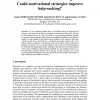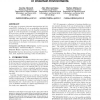65 search results - page 6 / 13 » Closing the Affective Loop in Intelligent Learning Environme... |
117
click to vote
AIED
2009
Springer
15 years 7 months ago
2009
Springer
Affect has been the subject of increasing attention in cognitive accounts of learning. Many intelligent tutoring systems now seek to adapt pedagogy to student affective and motivat...
AIED
2005
Springer
15 years 6 months ago
2005
Springer
We are exploring whether the use of facilities aimed at improving the learner’s motivation has an effect on learning food-chains and food-webs, but also on help-seeking behaviour...
104
click to vote
GECCO
2006
Springer
15 years 4 months ago
2006
Springer
In this paper we propose a Bayesian framework for XCS [9], called BXCS. Following [4], we use probability distributions to represent the uncertainty over the classifier estimates ...
132
click to vote
AR
2007
15 years 1 months ago
2007
—Researchers in robotics and artificial intelligence have often looked at biology as a source of inspiration for solving their problems. From the opposite perspective, neuroscie...
119
click to vote
AAAI
1997
15 years 2 months ago
1997
1 We have constructed a team of intelligent agents that perform the tasks of an attack helicopter company for a synthetic battlefield environment used for running largescale milita...


